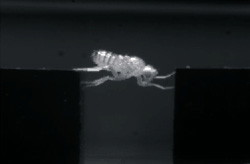Information processing in Drosophila: Initiation of a EU research network for doctoral candidates

The image taken from a high-speed video shows a fruit fly Drosophila of about 2.5 millimeters in body length engaged in climbing over a barely surmountable gap.<br>©: Strauss lab<br>
Eight European research institutes, including Johannes Gutenberg University Mainz (JGU) in Germany, and three commercial partners have joined forces in an EU project to provide young academics with an outstanding research environment in the field of systemic neuroscience. The project by the name of FLiACT has been awarded four years of EU-funding through the Marie Curie Actions program.
The participating partners are working on various complementary aspects of neuroscience, ranging from molecular genetics to bioengineering. The nervous system of the fruit fly, Drosophila melanogaster, will be serving as the research focus. The objective of FLiACT is to create a unique training network in order to develop new research sectors and promote collaboration among research institutes. The neurobiology work group headed by Professor Dr. Roland Strauss at the Institute of Zoology at Mainz University is also part of the network.
Discovering how the brain functions represents one of the greatest challenges of current research. In order to understand cognitive processes in the brain, it is necessary to analyze its activity at various levels, beginning with its genetic building plan and covering biochemical processes and neural circuits as well as the characteristics of certain types of behavior. Over the last decades, the fruit fly Drosophila has become the model organism used by scientists to investigate the means by which sensory information is gathered, processed, and stored, and behavioral output is generated. Drosophila has already proven useful when it comes to the investigation of the genetic causes of neurodegenerative disorders, such as Alzheimer's disease. The human brain has a million times more neurons than that of Drosophila, but because both share common principles, it is possible to understand complex brain functions by studying the miniature fly brain. Thanks to FLiACT, twelve young European researchers now have the opportunity of embarking on a doctoral dissertation project that will look at cutting-edge aspects of neuroscience.
The participants will undertake a considerable part of their work in cooperation with the partner institutions, for example as visiting scientists. They will receive training in interdisciplinary workshops to enable them to acquire skills in innovative technologies in the areas of neurogenetics, neuroanatomy, neuroimaging and behavior analysis, while the commercial project partners will provide them with insight into such aspects as technology transfer and project management. There are also opportunities for cooperation with the Janelia Farm Research Campus, a research institute of the Howard Hughes Medical Institute in the United States of America.
The research group led by Professor Dr. Roland Strauss at Mainz University will be contributing to the project with its work on the biochemistry of learning and the underlying neuronal networks. The group studies the persistence of memory – from memories that are retained for a few seconds only to those that last an entire lifetime. “Improvements in motor skills acquired by repetitive training, for example, can enhance the climbing success of a fly for its entire lifetime,” explains Strauss. But the insects are also capable of remembering the location of an object and of using it as a spatial orientation aid. Studies conducted in Mainz have shown that flies can remember the location of this object for several seconds after it has been removed from their environment. The researchers were able to pinpoint a small group of neurons that are responsible for this memory-based orientation ability. “The new EU network will help promote cooperation with other European research groups and thus lead to a better understanding of how the brain processes and retains information.”
The FLiACT project (Systems neuroscience of Drosophila: from genes to circuits to behaviors) is an Initial Training Network (ITN) sponsored by the European Union. It is being coordinated by Dr. Matthieu Louis of the Center for Genomic Regulation in Barcelona, Spain.
Media Contact
All latest news from the category: Life Sciences and Chemistry
Articles and reports from the Life Sciences and chemistry area deal with applied and basic research into modern biology, chemistry and human medicine.
Valuable information can be found on a range of life sciences fields including bacteriology, biochemistry, bionics, bioinformatics, biophysics, biotechnology, genetics, geobotany, human biology, marine biology, microbiology, molecular biology, cellular biology, zoology, bioinorganic chemistry, microchemistry and environmental chemistry.
Newest articles

High-energy-density aqueous battery based on halogen multi-electron transfer
Traditional non-aqueous lithium-ion batteries have a high energy density, but their safety is compromised due to the flammable organic electrolytes they utilize. Aqueous batteries use water as the solvent for…

First-ever combined heart pump and pig kidney transplant
…gives new hope to patient with terminal illness. Surgeons at NYU Langone Health performed the first-ever combined mechanical heart pump and gene-edited pig kidney transplant surgery in a 54-year-old woman…

Biophysics: Testing how well biomarkers work
LMU researchers have developed a method to determine how reliably target proteins can be labeled using super-resolution fluorescence microscopy. Modern microscopy techniques make it possible to examine the inner workings…





















